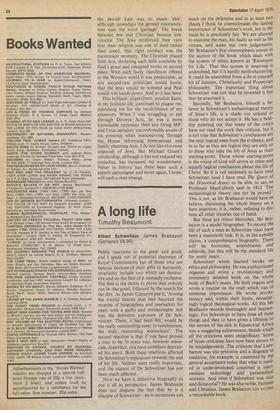A long life
Timothy Beaumont Albert Schweitzer James Brabazon (Gollancz £6.95) Public reactions to the great and good, and I speak not of potential chairmen of Royal Commissions but of those who are famous because of their gifts to humanity, invariably include two which are destructive and on the face of it mutually exclusive. The first is the desire to prove that nobody can be that good, followed by the search for the dirt. As James Cameron put it, 'Among the wistful fancies that had haunted the reveries of biographers and journalists for years with a guilty and unreasonable itch was the definitive exposure of Dr Schweitzer. There, it had been felt, would be the really outstanding essay in tastelessness, the truly resounding iconoclasm'. The second reaction is that if you have proved a man to be, in some way, however miniscule, imperfect, you have somehow destroyed his merit. Both these reactions affected Dr Schweitzer's reputation towards the end of his life. Neither were really important, and the stature of Dr Schweitzer has not been much affected.
Now we have a definitive biography to put it all in perspective. James Brabazon does not disguise the fact that he is a disciple of Schweitzer—he is sometimes too
much on the defensive and in at least two places I think he overestimates the lasting importance of Schweitzer's work, but in the main he is absolutely fair. We are allowed to examine the man, his faults as well as his virtues, and make our own judgements. Mr Brabazon's first overemphasis comes in the section of the book which deals with the system of ethics known as 'Reverence for Life.' That this system is inspiring is undoubted, but it is hardly earth-shattering. It could be assembled from a do-it-yourself kit of Jainism, Christianity and Popperian philosophy. The important thing about Schweitzer was not that he invented it but that he practised it.
Secondly, Mr Brabazon, himself a believer in Schweitzer's eschatological theorY of Jesus's life, is a shade too unkind to those who do not accept it. He has a fieldday pointing out that many of the critics have not read the work they criticise, but it is not true that Schweitzer's conclusions are the only logical ones from the evidence, and in so far as they are logical they are only so to those who take the life of Jesus as their starting-point. Those whose starting-point is the vision of God will arrive at other and equally logical conclusions about the life of Christ. So it is not necessary to have read Schweitzer (and I have read The Quest of the Historical Jesus) to be able to say as Professor MacCulloch said in 1912 'The eschatological theory can not be proved.' This is not, as Mr Brabazon would have us believe, dismissing the whole theory on a bare assertion; it is, rather, refusing to dismiss all other theories out of hand.
But these are minor blemishes. Mr Brabazon is a model biographer. To record the life of such a man as Schweitzer must have been a mammoth task. It is, as the subtitle claims, a comprehensive biography. There will be footnotes, amendments and addenda, but this will be the standard life for many years.
Schweitzer wrote learned books on ethics and philosophy. He was a sololconcert organist and wrote a revolutionary and immensely detailed book on the whole body of Bach's music. He built organs and wrote a treatise on the craft which was of immense importance. He wrote revolutionary and, within their limits, devastatingly logical theological works. All this Mr Brabazon records thoroughly and interestingly. For Schweitzer to have done all these things and then to have given a lifetime to the service of the sick in Equatorial Africa was a staggering achievement, beside which all the criticisms seem insignificant. Some of those criticisms have now been shown to be misjudgements. The criticism that Lambarene was too primitive and a disgrace to medicine, for example, is countered by the general acceptance today that what is needed in underdeveloped countries' is intermediate technology and paramedical workers. And what if Schweitzer was vain and dictatorial? He was also noble, humane and Christian. James Brabazon has written a remarkable book.


































 Previous page
Previous page